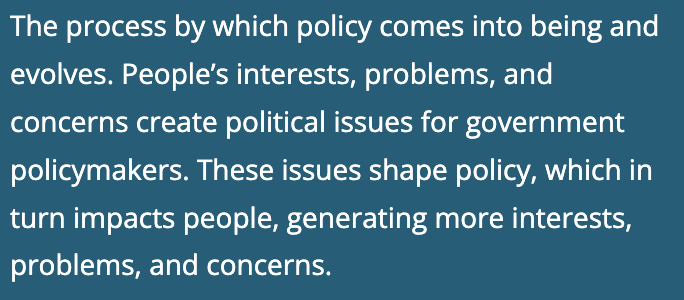American Government: Key Functions, Politics, and Democracy Principles
1/59
There's no tags or description
Looks like no tags are added yet.
Name | Mastery | Learn | Test | Matching | Spaced |
|---|
No study sessions yet.
60 Terms
Government
the organization of institutions that make public policy decisions for a society (e.g., Congress, President, Courts).
Purpose of Government
Maintain national defense, provide public goods (e.g., roads, schools), preserve order, socialize the young, and collect taxes.
Maintain National Defense, Provide Public Goods & Services, Preserve Order, Socialize the Young, Collect Taxes.
MPPCS
Maintain National Defense
Armed forces, ensuring protection.
Preserve Order
Public safety, calming protests, etc.
Socialize the Young
Instill patriotism, national political system values (pledge of allegiance).
Collecting Taxes
Funds public goods and services.
Politics
The process by which people choose leaders, policies, and actions. It involves who gets what, when, and how (Harold D. Lasswell).
Political Scientists
Study government decision-making.
Key Political Questions (harold d lasswell)
Who? Voters, candidates, groups, parties. What? Benefits & burdens. When? How? Ways people participate in politics (e.g., voting, protests).
Low Political Participation
low turnout and lack of political clout.
Single-Issue Groups
Focus on one issue, often voting solely on that basis (e.g., abortion, climate).
Citizen Influence
Citizens impact public policy by influencing policy decisions, raising problems, and emphasizing trouble.
First 2 steps of the Policymaking System Cycle
People: Have interests, problems, and concerns.
Linkage Institutions: Connect people to government (e.g., parties, elections, media, interest groups).
Policy Agenda
Issues that have attracted attention from public officials.
Policymaking Institutions
Branches of government that make policies (Congress, Presidency, Courts, Bureaucracy).
Policy
Government action.
Policy Impacts
Effects of policies on people and problems.
Political Issues
Disagreement about a problem and public action needed.
Public Policy
Every government decision (laws, budgets).
Statutes
Laws passed by Congress.
Presidential Actions
Decisions by the President.
Court Decisions
Legal opinions by Supreme or lower courts.
Budgetary Choices
Legislative enactment of taxes/expenditures.
Regulation
Agency guidelines for implementation.
Democracy
A system of selecting policymakers and organizing government to reflect citizens' preferences.
Challenges to Democracy
diverse interests
escalating campaign costs
limited participation in gov
political polarization
misinformation
complexity of issues
Ideal Democracy
Has Equality in Voting, Effective Participation, Adequate and equal opportunities, Enlightened Understanding
Enlightened Understanding
A theory stating that a democratic society must be a “marketplace of ideas”. Free press and free speech are essential to civic understanding.
Citizen Control of the Agenda
Collective right to control policy agenda.
Inclusion
Extend rights to all; citizenship open to all.
Majority Rule
Policy reflects the will of over half the voters.
Minority Rights
Guarantees rights to those outside the majority.
Representation
Describes relationship between leaders and followers; elected officials represent people's desires.
Pluralism
The theory that groups with shared interests influence policy through organized competition.
Elitism
Society divided into class lines, with the upper-class ruling. Elites pull strings of government; wealth determines power.
Hyperpluralism
Competing interest groups are so strong that government is weakened ('crippled').
Political Culture
Overall set of values widely shared within society.
Liberty
the freedom from governmental interference, (civil liberties and rights). It includes the freedoms guaranteed by the Bill of Rights, like freedom of speech, religion, and the press, as well as the right to due process and equal protection under the law
Individualism
People can succeed on their own without government intervention (unless needed).
Laissez-Faire
Policies promoting free markets and limited government. Less government in the US than other democracies.
Populism
political philosophy support the rights of average citizens against privileged elites.(emphasis on the people)
Egalitarianism
Equality of opportunity and respect. Americans never equal in terms, but everyone has a chance.
GDP (Gross Domestic Product)
Total value of goods and services produced annually in the US.
Equality in Voting
Principle of ideal democratic process ensuring every vote has equal weight.
Linkage Institutions
Institutions that connect citizens to the government and influence policymaking.
National defense
Important to protect the nation from external threats.
Public goods
Vital for the collective well-being and functioning of society, such as roads and college.
Politics
According to Harold D. Lasswell, it is about 'who gets what, when, and how.'
Political parties
A type of linkage institution that organizes electoral contests.
Media
A type of linkage institution that conveys public opinion and information.
Congress
One of the primary policymaking institutions responsible for deciding policy and passing legislation.
Presidency
Claims policy and implements laws through rules and regulations.
Statutes
laws passed by Congress.
MPPCS
Acronym for Maintain National Defense, Provide Public Goods & Services, Preserve Order, Socialize the Young, Collect Taxes - key roles of the government.
Collective Goods
Goods and services that are non-excludable and free for all to use (e.g., clean air, national defense).
Policymaking System

Effective Participation (trad dem theory)
The condition in a democracy where citizens have adequate and equal opportunities to express their preferences throughout decision making processes
congress
the legislative branch of the U.S. federal government
Bureaucracy
The part of government that implements laws and regulations through agencies.